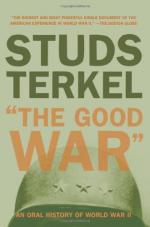
|
| Name: _________________________ | Period: ___________________ |
This test consists of 15 multiple choice questions and 5 short answer questions.
Multiple Choice Questions
1. What did British boys learn in the Know Your Enemy program?
(a) Fascist philosophy.
(b) German language.
(c) Aircraft recognition.
(d) Weapon recognition.
2. What did Walter Rosenblum do during WWII?
(a) He was a brigade commander.
(b) He was a combat photographer.
(c) He was a Voice of America reporter.
(d) He was a flautist in the army band.
3. How did Yasuko Kurachi Dower believe most Japanese civilians felt about the war?
(a) Confused.
(b) Ashamed.
(c) Resigned.
(d) Enthusiastic.
4. What does Erich Luth say the German nation lacks?
(a) Communal courage.
(b) Civil courage.
(c) Military courage.
(d) Personal courage.
5. How was Joseph Small released from the service?
(a) He was given a discharge under honorable conditions.
(b) He was given an honorable discharge.
(c) He was given a discharge under dishonorable conditions.
(d) He was given a dishonorable discharge.
6. How did Galatea Berger remember soldiers smelled in Germany?
(a) Soldiers smelled like gunpowder.
(b) Soldiers smelled unwashed and unpleasant.
(c) Soldiers smelled like alcohol and tobacco.
(d) Soldiers smelled like cigarettes, gum, and chocolates.
7. Why didn't Henry Hatfield want to broadcast the destruction done to German cities?
(a) He thought Germany was old news.
(b) He was heartsick at the ruins he observed.
(c) He thought other stories were more compelling.
(d) He didn't think Americans wanted to gloat.
8. Why was George Page able to buy beachfront property cheaply during the war?
(a) People had no money to invest.
(b) People weren't interested in buying real estate.
(c) People were only building in the cities.
(d) People expected a Japanese invasion.
9. What is a thirteen-week wonder?
(a) A soldier discharged for poor health.
(b) A product of Officers' Candidate School.
(c) A new recruit.
(d) A soldier who completed boot camp training.
10. According to Ray Wax, why did Americans feel good during WWII?
(a) They were having an adventure.
(b) They were doing something worthwhile.
(c) They were making money.
(d) They were demonstrably the best.
11. What was the first English phrase Japanese children learned after the war?
(a) "Panel discussion."
(b) "Merry Christmas to you, too."
(c) "Thank you very much."
(d) "It wasn't my fault."
12. When did German teenagers in the Luftwaffe study for the flak brigade?
(a) From 2:00 p.m. to 11:00 p.m.
(b) From 11:00 p.m. to 2:00 a.m.
(c) From 2:00 a.m. to 11:00 a.m.
(d) From 11:00 a.m. to 2:00 p.m.
13. Why was Walter Rosenblum welcomed in French farmhouses during the war?
(a) He had access to army rations.
(b) He brought news from the front.
(c) He offered protection from looters.
(d) He was an entertaining storyteller.
14. According to James Rowe, when do Democrats become Republicans?
(a) When they become poorer.
(b) When they become richer.
(c) When they become smarter.
(d) When they become more foolish.
15. What did Goebler see for the first time when the Americans rescued the German submarine crew?
(a) Sophisticated equipment.
(b) People speaking English.
(c) Courtesy in war.
(d) Black men.
Short Answer Questions
1. How does Olga Norwak characterize wartime romance?
2. Why was Joseph Small tried for mutiny?
3. What did John Baker know if he heard an up-and-down howling siren as a child?
4. How did the Japanese people feel about the Japanese war veterans?
5. What were the two big top secret projects?
|
This section contains 591 words (approx. 2 pages at 300 words per page) |

|




